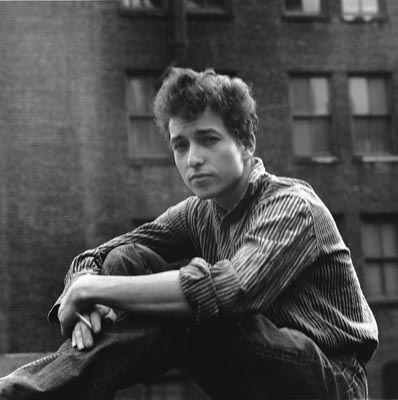Bob Dylan, the single most iconic singer-songwriter of the past half century, turns 75 years old tomorrow.
And this has to do with religion — why?
Because, all along, Dylan has been creating music that incorporates, reflects, and even illustrates the Jewish experience in the world.
And, yes — I am fully aware that there were times in Dylan’s life when he lived as a Christian.
His album “Slow Train Coming” has crosses both on the album cover, and imbedded in the songs.
“Precious Angel,” which appears on that album, is so Christian as to be theologically anti-Semitic. What else do you make of a line like: “You were laboring under the Law…”? It’s as if Paul himself (and no, not McCartney — I’m talking about the “original” Paul) had jumped across time and had joined Bob in the recording studio.
Back to Dylan’s Jewish stuff. Others (in particular, American Jewry’s greatest Dylan scholar, Seth Rogovoy, author of the definitive book on Bob Dylan and Judaism) have their own choices for Dylan’s most Jewish work. You’ll probably have your own as well.
Here is my own list of “Bob Dylan’s Greatest Jewish Hits” (alert: cool videos coming).
“Highway 61” begins with a re-telling of the Akedah, the story in Genesis about how God commanded Abraham to sacrifice his son, Isaac.
“Gates of Eden.” A realization that, ever since Adam and Eve were expelled from the Garden of Eden, we have been living in an unredeemed world.
“When The Ship Comes In.” An evocation of redemption in history, with a biblical reference to the drowning of Pharaoh’s army.
“Father of Night.” From the “New Morning” album. Why don’t Jewish Dylanologists give this song the attention that it is due? It is a hymn to God, deeply Jewish in its theological content — a close cousin, liturgically, to “Adon Olam.”
“Man Gave Names to all the Animals.” An accurate re-reading of the Genesis text, in which God gives Adam the task of naming the animals, which forever enshrines humanity as the category-creating being.
“Neighborhood Bully.” Great melody, and great message: a clear, barely disguised love song to the state of Israel, doing what it must do to survive in a hostile neighborhood. And still, she is called the “neighborhood bully.” One of the greatest affirmations of a Jewish idea that has ever appeared in popular musical culture.
“Forever Young.” A beautiful blessing, with biblical overtones (“May you build a ladder to the stars, and climb on every rung”). I have used this song as a blessing for bar and bat mitzvah kids — as well as for octogenarians (and older) who are celebrating their birthdays.
“Everything is Broken.” Think of all the broken things in Judaism: Abraham’s childhood idols (check out my book on this exciting and radical topic) ; the tablets of the Law; the broken glass at Jewish weddings; the windows of shops, homes, and synagogues of Kristallnacht — and, according to Jewish mysticism, existence itself, and the Name of God Itself. Which leads us to the task of tikkun olam (repairing the world).
Dylan’s true Jewish musical heir is his son-in-law, Peter Himmelman — a rock star who is an observant Jew, and whose music is infused with Jewish themes.
Check out, in particular, his slamming of idolatry in “Impermanent Things.” It is one of the most profound Jewish statements in rock music.
Let us return to Dylan’s early career.
“Talkin’ Hava Nageilah [sic] Blues” (1962). Just consider this, for a moment. This was 1962 — still years before American Jews were comfortable with overt ethnic consciousness. And yet, here is this 21 year old kid from Hibbing, Minnesota (not among the capital cities of the American Diaspora) singing “Jewish.” Here’s a cover of the song.
But this pales in significance to:
“With God On Our Side.” This was on Dylan’s 1964 album “The Times They Are A-Changin’.”
Consider this verse.
When the Second World War
Came to an end
We forgave the Germans
And we were friends
Though they murdered six million
In the ovens they fried
The Germans now too
Have God on their side.
Today, American culture is filled with Holocaust references.
But, “With God On Our Side” came out in 1964.
At that point in American cultural history, references to the Holocaust were rare. Yes, “The Diary of Anne Frank,” in the early 1950s. Yes, Elie Wiesel’s “Night,” published in 1960.
And, yes, remarkably, there was an episode of “The Twilight Zone,” which takes place in the Dachau concentration camp, where a returning Nazi war criminal is tormented by his former victims. The episode appeared in 1961, and it was written, of course, by Rod Serling, who was Jewish.
It would take another fourteen years until the “Holocaust” mini-series appeared on NBC, which was how many Americans first encountered the horror.
“With God On Our Side” was, therefore, one of the earliest references to the Holocaust in American popular culture.
And, though it did not mention “Jews,” it did mention the canonical number of victims, as well as a grisly reference to the disposal of the bodies.
Dylan was one of the first figures in American culture to mention the Holocaust.
In so doing, he actually helped American Judaism find its voice.






